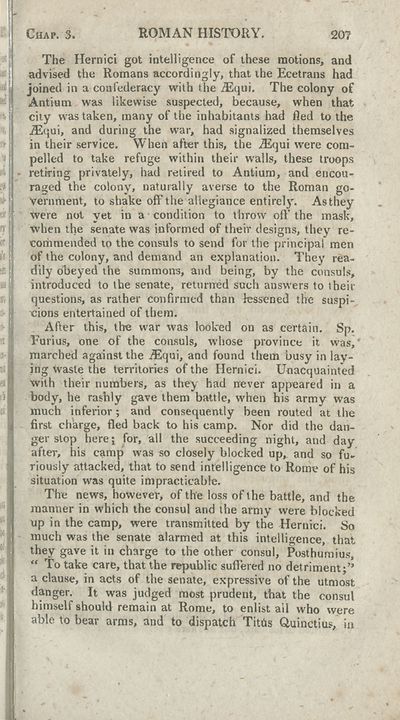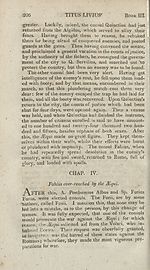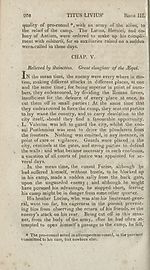Download files
Complete book:
Individual page:
Thumbnail gallery: Grid view | List view

Chap. 3.
ROMAN HISTORY.
207
The Hernici got intelligence of these motions, and
advised the Romans accordingly, that the Ecetrans had
joined in a confederacy with the iEqui. The colony of
Antium was likewise suspected, because, when that
city was taken, many of the inhabitants had fled to the
iEqui, and during the war, had signalized themselves
in their service. When after this, the Aiqui were com¬
pelled to take refuge within their walls, these troops
retiring privately, had retired to Antium, and encou¬
raged the colony, naturally averse to the Roman go¬
vernment, to shake off the allegiance entirely. As they
were not yet in a condition to throw off the mask,
when the senate was informed of their designs, they re¬
commended to the consuls to send for the principal men
of the colony, and demand an explanation. They rea¬
dily obeyed the summons, and being, by the consuls,
introduced to the senate, returned such answers to their
questions, as rather confirmed than lessened the suspi¬
cions entertained of them.
After this, the war was looked on as certain. Sp.
Furius, one of the consuls, whose province it was,'
marched against the Aiqui, and found them busy in lay¬
ing Waste the territories of the Hernici. Unacquainted
with their numbers, as they had never appeared in a
body, he rashly gave them battle, when his army was
much inferior; and consequently been routed at the
first charge, fled back to his camp. Nor did the dan¬
ger stop herei for, all the succeeding night, and day
after, his camp was so closely blocked up, and so fu¬
riously attacked, that to send intelligence to Rome of his
situation was quite impracticable.
The news, however, of the loss of the battle, and the
manner in which the consul and the army were blocked
up in the camp, were transmitted by the Hernici. So
much was the senate alarmed at this intelligence, that
they gave it in charge to the other consul, Posthumius,
“ To take care, that the republic suffered no detriment;’'’
a clause, in acts of the senate, expressive of the utmost
danger. It was judged most prudent, that the consul
himself should remain at Rome, to enlist all who were
able to bear arms, and to dispatch Titds Quinctius, in
ROMAN HISTORY.
207
The Hernici got intelligence of these motions, and
advised the Romans accordingly, that the Ecetrans had
joined in a confederacy with the iEqui. The colony of
Antium was likewise suspected, because, when that
city was taken, many of the inhabitants had fled to the
iEqui, and during the war, had signalized themselves
in their service. When after this, the Aiqui were com¬
pelled to take refuge within their walls, these troops
retiring privately, had retired to Antium, and encou¬
raged the colony, naturally averse to the Roman go¬
vernment, to shake off the allegiance entirely. As they
were not yet in a condition to throw off the mask,
when the senate was informed of their designs, they re¬
commended to the consuls to send for the principal men
of the colony, and demand an explanation. They rea¬
dily obeyed the summons, and being, by the consuls,
introduced to the senate, returned such answers to their
questions, as rather confirmed than lessened the suspi¬
cions entertained of them.
After this, the war was looked on as certain. Sp.
Furius, one of the consuls, whose province it was,'
marched against the Aiqui, and found them busy in lay¬
ing Waste the territories of the Hernici. Unacquainted
with their numbers, as they had never appeared in a
body, he rashly gave them battle, when his army was
much inferior; and consequently been routed at the
first charge, fled back to his camp. Nor did the dan¬
ger stop herei for, all the succeeding night, and day
after, his camp was so closely blocked up, and so fu¬
riously attacked, that to send intelligence to Rome of his
situation was quite impracticable.
The news, however, of the loss of the battle, and the
manner in which the consul and the army were blocked
up in the camp, were transmitted by the Hernici. So
much was the senate alarmed at this intelligence, that
they gave it in charge to the other consul, Posthumius,
“ To take care, that the republic suffered no detriment;’'’
a clause, in acts of the senate, expressive of the utmost
danger. It was judged most prudent, that the consul
himself should remain at Rome, to enlist all who were
able to bear arms, and to dispatch Titds Quinctius, in
Set display mode to:
![]() Universal Viewer |
Universal Viewer | ![]() Mirador |
Large image | Transcription
Mirador |
Large image | Transcription
| Antiquarian books of Scotland > Curiosities & wonders > Titus Livius' Roman history > (211) |
|---|
| Permanent URL | https://digital.nls.uk/115985681 |
|---|
| Description | Thousands of printed books from the Antiquarian Books of Scotland collection which dates from 1641 to the 1980s. The collection consists of 14,800 books which were published in Scotland or have a Scottish connection, e.g. through the author, printer or owner. Subjects covered include sport, education, diseases, adventure, occupations, Jacobites, politics and religion. Among the 29 languages represented are English, Gaelic, Italian, French, Russian and Swedish. |
|---|

